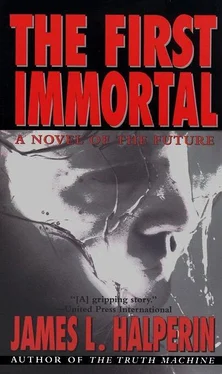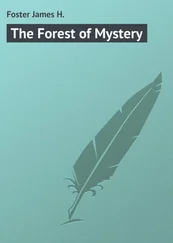Toby nodded; in his ears he could hear the rush of his own blood.
“I used to be a doctor, too, you know. Went through the same scientific disciplines and training as you and my father did. Science nourishes my art, for one thing; at least that’s what I tell myself. But mostly I love the process of trying to understand the truth about things.”
Toby smiled weakly and thought, Like father, like son.
“Recently, I’ve been reading books on cosmology,” Gary continued. “Fascinating stuff. Those scientists go after the universe like safecrackers. Cosmologists have a term they use to define circumstances where the known laws of science collapse, like at the event horizon of a black hole. That’s where the four forces—electromagnetic, strong nuclear, weak nuclear, and gravity—all break down. But break down into what ? No one knows. They call the effect a ‘singularity.’”
Toby listened, but could not imagine where Gary was leading.
“You can take this concept, this singularity, and use it to illustrate a philosophical concept. We can understand nature’s laws and make precise predictions of what will happen given a specific set of initial conditions. These laws will work for each of the four forces independently of each other. I think the same holds true for us. We can write human laws that are universally applicable, and make fair judgments in one-, two-, and even three-dimensional circumstances.”
Gary paused and stared at him. “But there are other times, aren’t there, Toby? Times when situation, emotion, ethics, and honor converge, or crash into each other, and create the kind of philosophical singularity I’m talking about. The kind that compels us into actions which in any other context would be unjustifiable. I think that’s what happened with you and my father. I think you experienced just such a singularity together. How can you apply any universal laws to a singularity? You can’t. The old rules don’t work. You can only judge it subjectively, through empathy, in other words, by asking yourself what you’d do in the same situation. And that’s the question I’ve been asking myself for weeks.”
Toby’s hands trembled and his head bowed. He steeled himself for an adjudication from the one person whose opinion mattered more to him than any jury’s.
“My answer,” Gary said, “is that I hope I would do exactly as you did. Which is why you owe me no explanation or apology. I came here to clarify that. I have no need to forgive what you did. I admire it.”
By the time that Toby was finally able to raise his head, Gary had already left.
Toby would sit in quiet contemplation for nearly an hour, gathering strength for his ongoing ordeal. But when he rose from his desk, he would no longer be the same man he’d watched shaving in the mirror that morning. He’d been given a gift of courage that would last him a lifetime.
The afternoon deposition took place in Webster’s office; an accommodation to the expert witness who had flown in from New York City. There were no conference rooms available in the District Attorney’s building, and Banks & Smith’s modest facility would have required at least an hour’s cab ride, while Fialkow, Webster, Barnes & Zeeve was barely two miles from Logan Airport.
Even so, had the request come from Noah Banks, Webster would have told the man to go screw himself. But Brandon Butters was a different story. The D.A.’s office was a bridge no intelligent lawyer would wish to burn.
Webster thumbed through the expert report as he questioned its author. A stenographer tapped quietly at her small machine. Also in attendance were Brandon Butters, Noah Banks, and Tobias Fiske, all of whom had learned to keep conversation with the opposing side to a minimum. Toby studied his copy of the report and reviewed copious notes on a yellow pad of lined paper.
“Please state your name, age, occupation, and credentials for the record,” Webster began.
“Dr. Brett Wong, forty-nine. I’m a molecular biologist, with a B.A. from Yale, and an M.D.Ph.D. from UCLA. I now conduct research, while teaching at Columbia University. I’ve been a full professor for the past six years.”
“You state in your expert report that Ben Smith can never be brought back to life under any conceivable circumstances. Is that still your contention?”
Wong folded both hands into his lap. “Yes, that’s correct.”
“As I read this, I see you believe that at liquid-nitrogen temperature, ice damage so corrupts cells as to render them permanently nonviable.”
“Yes. In many cases.”
“Not all?”
“No. Not even most. But far more than a critical amount.”
“Dr. Wong, could you please describe, in the simplest terms possible, what happens to a typical human cell when it is so frozen?”
As the witness spoke, Toby wrote furiously on his notepad.
“Certainly,” Wong answered. “Most cells are about ninety percent water. At minus 196 degrees Celsius, water will expand by roughly ten percent. It also crystallizes, which in some cases may actually puncture the cell membranes. That effect, however, is relatively rare. What does happen, almost uniformly, is that ice squeezes and disrupts the ions and proteins of tissue, occasionally forcing them into shrinking pockets of residual unfrozen water. And sometimes the fabric of a cell itself becomes crushed into tiny spaces among the ice crystals.”
“But many types of human cells have been frozen successfully, haven’t they?”
“Yes.”
“And isn’t human blood frozen routinely?”
“Certainly. But unlike most of our cells, red blood cells contain no nuclei. A percentage of the other blood cells, such as lymphocytes, die in the process. But even so, frozen blood, once thawed, is functional. That wouldn’t necessarily be the case with other organs.”
“I see.” Webster accepted a note from Toby, and read it. “But Dr. Fiske tells me that lengths of intestine have been frozen in liquid nitrogen, thawed, and worked afterward.”
“True. But an organ is not a living animal.”
Toby tore another page from his notepad and handed it to Webster.
“What about worms and other simple organisms that have been frozen and thawed without apparent harm?” the lawyer asked. “Wouldn’t those be considered animals?”
“Well, those are much less complex than mammals, obviously.”
“Aren’t human embryos and sperm often frozen, then stored for later use?”
“Yes. But long before any mammal is viable outside the womb, it becomes too fragile to survive that kind of damage. Its cells become interdependent, and even small disruptions in the balance will kill the organism.”
“And I suppose the human brain is more delicate still?”
“More delicate? Depends on your definition of the word,” Wong answered. “Certainly brain cells are larger than other cells, and will not normally self-repair or regenerate. Besides, human neurons don’t grow or divide. Therefore, I believe the loss of each brain cell would be more devastating than the loss of any other type of cell.”
Webster read another note from Toby: “Could scientists build a system to set out modified microorganisms that might guide the neurons and glial cells toward their own repair or regeneration?”
“No. That’s impossible.”
“Impossible?” Webster read. “Can’t bacteria and viruses do things at least that complex?”
“Well, yes. But in my opinion, human beings are simply not capable of achieving that level of technology.”
“In your opinion. I see. Please tell us what is likely to happen to this patient’s frozen cells once they’re thawed.”
“With the cryopreservation techniques that were used on Dr. Smith, I’d estimate about six percent of the cells would be completely dead upon thawing. Of the remaining cells, if they survived long enough, most would eventually revert to their former condition, but a certain percentage wouldn’t.”
Читать дальше












